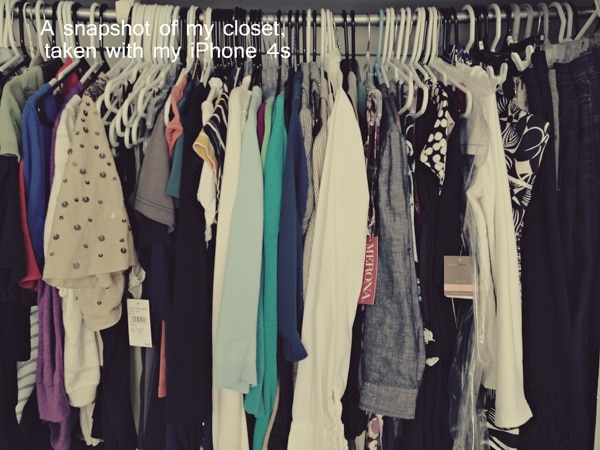 (and the upper class as well, but I liked the alliteration)
(and the upper class as well, but I liked the alliteration)
by Jenna
Jenna balances motherhood, photography, and blogging while dreaming big dreams in a high rise in Chicago. She’s looking forward to a move to the Bay Area this fall, with plans to eat as many locally grown avocadoes as humanly possible.
I have only very recently come to loathe the word modesty. Previously I considered it a badge of honor, and felt proud that I was doing it “right”. I thought a little bit about my intentions, but mostly I kept my shoulders covered and constantly tugged my pencil skirts down toward my knees (which was difficult to do while simultaneously patting myself on the back).
Blogging opened me up to a world of alternative viewpoints, and I realized that my friends wearing strapless dresses didn’t seem so bad, and my perception of modesty was altered. Modesty for me might be about cap sleeves and kept promises, but the goal for everyone should be self-respect. A modest woman dresses with self-respect, and self-respect looks different on everyone.
I am in the midst of yet another shift in my thinking that takes the idea of self-respect and expands on it.
When the Occupy Wall Street protests were going on my husband pointed out that although we might not be part of the 1% in America, we are part of the 1% when you look at the entire world. Maybe even the 1% of the 1%. I live each day of my life profoundly grateful and often overwhelmed by this. I have never wanted for food, medicine, clothing, or shelter. I not only have my needs met at all times, but almost always my wants as well. This means I shop often, use clothing as a weight loss motivator, and buy new dresses when I already have half-a-dozen in my closet. Somehow I always need another pair of jeans.
I cannot seem to nail down what modesty means for a woman like myself, spending my days without thinking twice about the necessities in life. Can I get excited about the polka dot dress from Nordstrom that my mom gave me for Christmas? And is it automatically vain to post an outfit I wore on my personal blog? Can I pine for the perfect pair of black peep-toe platform heels when I already have half a dozen black heels in my closet (and several more in the “to donate” pile)?
Of course I know deep down that the answer to these questions is something profound like “Modesty is a highly individualized product of self-respect and self-restraint” but I keep getting bogged down in the practicalities of the issue. How do I achieve modesty throughout all areas of my life?
A good starting point for me has been expressing gratitude for what I already have in my closet. The phrase “I don’t have anything to wear” should never cross my lips, because I have plenty. I’m also working hard to avoid placing importance on the name of the designer who created what I’m wearing. I think it is okay for me to care about color, fit, and the way things make me feel when I wear them, but I shouldn’t like something just because so-and-so has their name on the label. One of my favorite and most frequently worn dresses is from Walmart! Sometimes when I receive compliments on that dress I think to myself “This old thing? It’s just from Walmart,” and I know the same thought would never cross my mind if I had paid full price for it at J. Crew. I don’t want to be that person.
This doesn’t mean I’m not going to get new things, as I have no intention of living my life as an ascetic. I have two new dresses from my parents hanging in my closet that are birthday gifts, and I just sent my husband an email with the link to a dress that I wanted him to get me for my 27th birthday celebration. When it comes to my wardrobe though, I want to be prudent about how full I let it get, and work hard to remember to be grateful for all the beautiful things I’ve received and been able to buy.
Later this year we’re going to move to San Francisco, which means we are thinking about housing again. We’ve decided that renting still makes the most sense for us, and though I won’t find a rental for a few months because of the market in the particular area I have started hunting and daydreaming about where we might live. We’ve set a budget that feels appropriate, but I constantly find myself drifting toward the houses with expansive skylights and huge windows and more bedrooms than we need. What I’m daydreaming about isn’t modest because it’s moved past the point of addressing our needs. We’ve set our priorities (a backyard and at least 3 bedrooms, safe neighborhood and good commute) and I have to constantly remind myself that we are likely never going to move “down” in terms of housing and lifestyle (barring being forced to do so for financial reasons) and so it’s important that we remain modest in our housing choice. Once we have 3 bedrooms, I’m going to always feel like I need 3, and I’ll likely spend my time hoping for 4. If we live in a 4 bedroom place and find that we need to downgrade to 3 again… I’m going to feel pretty deprived (I realize unnecessarily, but recognizing that doesn’t make it less likely to happen in my brain unfortunately).
I do not write this post intending anyone reading to spend time thinking about how *other people* aren’t being modest. There is nothing productive that comes from such reflection. The debate about what type of lifestyle is “okay” is going to be never-ending (if I make $1,000,000/year and give away half, have I given enough? Is that when I get to have my Prada bag and Loboutins guilt-free?) And we just don’t know enough to understand how some people are able to experience the things they do. Maybe their travels are the result of credit card schemes, maybe your friend’s mani/pedi routine is the only time she spends money on herself, maybe the designer dress is a gift from grandma that is worn out of respect and gratitude. No two people are ever going to have the same definition regarding what constitutes modesty in regards to clothing, cars, food, travel, housing, and so forth.
If we’re going to be talking about modesty with girls like myself, girls with closets overflowing with clothing, items that may at times never have their tags removed before being relocated to the donation pile, we need to be talking about not only self-respect, but vanity and over-consumption. Modesty isn’t about shoulders and kneecaps, it’s found in the reasoning behind the choices we make. There is no right or wrong answer, no magic formula for correctly categorizing wants and needs in neat little compartments that everyone else will agree with. Each of us must be willing to ask some tough questions, look straight into the mirror and say “I know the reasons for my choices and I know they are true to who I want to be.”
Until I master that, I’m going to keep working on the last commandment of the Big 10. I can’t seem to stop coveting the new pair of heels my mom picked up at Nordstrom Rack last week.






15 Responses
This post comes at an interesting time for me, this week I’m staying in an exclusive resort villa just steps from the ocean in the Dominican Republic. I’m here with 45 others including a number of one percenters for a destination wedding. This is quite a contrast to the minimalist poverty level I experienced a year or so ago studying the homeless. I have given these concepts and questions a lot of thought. I think the question you pose is answerable …if I make $1,000,000/year and give away half, have I given enough? Is that when I get to have my Prada bag and Loboutins guilt-free? The desire for these things is simply a form of lust, it’s easier to see when we use very expensive examples less so when items seem more affordable to us. The question really asks have I shared enough yet to enjoy my lust guilt free? The problem with lust, like any addiction is that it can get in the way of your relationship with others including God and the needy. Once we have trancended lust we are free to indulge ourselves but likely won’t because by then we then come to understand expensive bags, shoes, cars and homes, etc. are about ego.
I like this. I don’t need to feel bad about buying expensive boots (I have high arches and wide calves which makes finding any boots at all extremely difficult) that are built to last because I have good intentions when I made the purchase.
A pair of expensive shoes that are really uncomfortable and mostly to show off for my friends? Not modest. 🙂
This Friday is my birthday. So I treated myself this month to a haircut and two pair of new shorts for the summer time. And I plan on taking myself out to lunch. Do I feel guilty? On one level, yes, but then on another level no. I know I needed the haircut as I was looking and feeling like a vagabond. I know that I needed the shorts as the three pair that I have are well over three years old and they also have some stains on them. As I’m typing this I’m even contemplating taking them back because I feel guilty for treating myself. But, I know I really do need them.
I don’t think this is a matter of what you have, or don’t have or even whether or not this is being modest. I think it is more about using our resources wisely and making sure we really do need the things that we consume.
And as someone who was at one time actually homeless, I find it really very rude for someone to say that they lived a minimalist lifestyle to ‘see” what it is like to be homeless. I find that someone saying that they chose to live this lifestyle as a matter of personal choice is not being modest at all and it really doesn’t even begin to get to heart of such a complex issue of the homeless .
I’m sorry you feel this way Diane, I was following the Spirit in that persuit looking for a place that I could contribute. I’m now involved with a number of organizations who help the needy world wide and I help connect the well to do to these causes my experience on the street supports that effort.
But, what you are still failing to grasp is that you “chose” to live this way. People who are homeless, do not “choose.” And you cheapen their experience by pretending that you can now grasp the severity of their situation. You simply can’t possibly even remotely understand what is going on.
You could have gone to different organizations all on your own without having to do this. What you did was more self serving than anything else.
Diane,
I inderstood from the begining that this was a choice for me and not a choice for most of them and I don’t claim to inderstand the severity of their situation but I do have a much better understanding of it than before the experience. Please feel free to enlighten me if you have something to add.
I live in the Bay Area. If you would like to talk about the area, leave a comment on my blog with your info. I’d be happy to talk about the area. Love! p.s. I won’t publish your info.
I’m also trying to be more modest in my lifestyle, and I usually like it. Sometimes it is annoying to want to shop, but not have anything that I want to acquire. 🙂
I’m also trying in my discussions with teenagers to talk about modesty beyond body coverage. Modesty as appropriateness and respect in all aspects of our lives.
“If we’re going to be talking about modesty with girls like myself, girls with closets overflowing with clothing, items that may at times never have their tags removed before being relocated to the donation pile, we need to be talking about not only self-respect, but vanity and over-consumption. Modesty isn’t about shoulders and kneecaps, it’s found in the reasoning behind the choices we make.”
This is great. I’m so happy to read a post that deals with the issue of consumption and class – thanks so much for your thoughts!
A friend of mine majored in fashion design – and agonized over it. She loved clothes, fashion, and was an excellent, creative seamstress. We would look through magazines and catalogs together and she would point out interesting, artsy pieces and combinations, yet she was worried that her passion was inherently shallow and vain.
Her father had always been a very stylish, label-conscious, well-to-do young man growing up, but then he was called to serve his mission in an area that included an impoverished Indian reservation. He told my friend and her siblings a story of helping a Native American woman who was caught out at night in a snowstorm with her young child. She was walking through deep snow drifts wearing a long skirt and a pair of donated Nike hightops; a decidedly unfashionable ensemble, and one that he would have mocked as a high school student. The sight of this woman, poor and in the cold, carrying herself with quiet grace and dignity, created an indelible impression on him and filled him with deep shame for his pettiness. He told his children often of that transformative moment and tried very hard to instill in them the sense that it is wrong to judge people for their clothing or appearance. My friend was worried, after having heard that story many times growing up, that her father would disapprove of her love of fashion design.
After talking with her about it, I found myself thinking that it really is about the intents of the heart rather than money itself. If you enjoy fashion as an art form, this seems completely ethically and morally neutral to me – but if you use fashion, style, wealth, labels, etc. as a means to assess the character and worth of other people, or as a way to vaunt yourself above other people, then you are in the wrong.
You story of the Native American woman reminds me of a very personal one my husband has told me. It’s so hard to remember though, when we go out into a world where it feels nice to be well dressed and receive compliments, and to not feel self-conscious when spending time with certain crowds. We are unfortunately judged by our appearance and in certain situations it becomes important to invest more than we might otherwise in our appearance (clothes, car, home, etc) to ensure that we don’t stand out in a bad way (or that we stand out in a good way).
Jenna,
I think you make some great points here. I really like your point, “we need to be talking about not only self-respect, but vanity and over-consumption.”
Over-consumption is the one that I most worry about these days. I tend to buy cheap, non designer clothes. But because they are cheap, I often buy a lot — more than I need, that’s for sure. I hope that in the future I will learn to buy higher quality clothing, but much much less of it.
I hope some YW’s leaders will read your post and get some fresh ideas about how to teach the modesty principle to young women.
I’ve been trying to thrift more. That makes me feel less guilty about having a full closet (the thrift store I buy from is a non-profit that gives back to the community too!).
As a current YW president– I refuse to teach modesty only in terms of what you wear. It encompasses so much more, as your post brings to light. Modesty is something in one’s soul– it starts in your mind and heart and is the motivation behind how you live your life.
It is the strength of your spirit, not the length of your dress…
“I have to constantly remind myself that we are likely never going to move “down” in terms of housing and lifestyle (barring being forced to do so for financial reasons) and so it’s important that we remain modest in our housing choice.”
Great article. I think this particular point is extremely important because it is a reminder that many of the principles taught by the LDS church can greatly benefit the people who follow them and that we lose sight of the blessings attached to certain commandments when we focus on the wrong thing. A common example of this is the Word of Wisdom. When you spend all your time judging others for drinking coffee, but neglect to eat your fruits and vegetables, you miss out on the full spectrum of blessings that the WoW offers. I never realized that the same logic applies to modesty until I read this post. Living a modest lifestyle can protect us debt, financial stress, envy, and more.
Jenna, thank you for sharing your insights/process of thinking about this important issue. It particularly liked hearing about your changed thoughts as you developed relationships with those who did not grow up with the same definitions (or expectations) of modesty, and how you had to dig deep to discover what modesty means for you, who did. I think you pinpointed exactly how modesty is as much (or MORE) about how we choose to live our lives, And that it expands to Every area of our life, as opposed to only our hemlines.